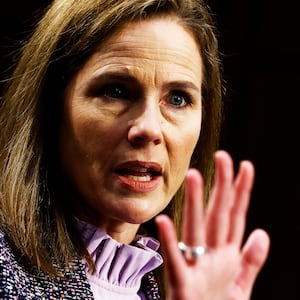When it appeared on Netflix in January of 2018, the documentary Liberated: The New Sexual Revolution looked normal enough: an hour-and-a-half-long examination of spring break and youth hookup culture featuring some experts, a smattering of twentysomething hedonists, and anodyne questions about sexual norms. “What does it mean to be masculine?” a voiceover asked in the trailer. “What does it mean to be feminine?”
Netflix licensed the film from Magic Lantern Pictures, a production company that claims to create “unflinching films that take you to the front lines of current social issues.” But the website only mentions one social issue: sexuality. In a nine-bullet “Manifesto,” the company encourages viewers to embrace maxims like, “My life will not be dominated by lust and entitlement, which falsely promise freedom, but only produce slavery.” Below, in a section titled “Get Wise,” the group links to resources like Culture Reframed, an organization that calls porn and “hypersexualized” media “the public health crisis of the digital age." It's run by Gail Dines, whom the Guardian once dubbed “the world’s leading anti-porn scholar and activist.”
Magic Lantern Pictures’ laser focus stems its affiliation with Exodus Cry, the conservative Christian nonprofit dedicated to abolishing the commercial sex industry. Since February, Exodus Cry has been waging a campaign to shut down Pornhub on the grounds that the company enables sex trafficking. Dubbed #Traffickinghub, the movement rode the wave of hysteria over sex trafficking and pedophilia spurred in part by QAnon and the #SavetheChildren movement this past summer.
Exodus Cry’s CEO Benjamin Nolot, who also wrote and directed Liberated, has taken hardline stances against homosexuality, which he once called “an unspeakable offense to God.” Nolot has since said his views on LGBTQ+ issues have “evolved” and that he advocates “for the right of all people to be free from all forms of oppression.” But his views have apparently not changed on abortion, which he has routinely compared to the Holocaust. “To the ‘logic’ behind abortion –” Nolot tweeted in 2013, “Hitler says hi.”
Exodus Cry describes itself as religious and non-partisan. (It claims #Traffickinghub, despite being entirely operated and funded by Exodus Cry, is non-religious.) The group sprung from the right-wing evangelical church IHOP (the International House of Prayer), whose founder Mike Bickle endorsed Ted Cruz for president in 2016, and later joined the “POTUS Shield,” a Pentecostal group that believes Donald Trump will usher in a spiritual Great Awakening. (Exodus Cry denies any formal association with IHOP; The Daily Beast reported on their legal and personal ties last week).
In 2016, for example, when Nolot’s wife hosted a GoFundMe campaign soliciting funds to buy him a Toyota Tacoma “to haul around his hockey and fishing gear,” she recommended people donate to IHOP. “If by any chance you would like to do any end of the year giving and would like tax deduction,” she wrote, “I have an easy way to give online through our IHOP account. Would you like to sow into Benjamin Nolot’s life?”
Nolot has produced and directed four other films associated with Exodus Cry: Nefarious: Merchants of Souls, a 2011 documentary about sex trafficking; Spring Break Emcees, a 2017 short similar to Liberated; 2019’s short, Seattle’s Bikini Baristas, which claims that “behind the intrigue of lingerie and java lurks a darker side;" and Existence, a six-minute “visual poem” starring Nolot and three of his family members, shot in the Virgin Islands.
For what they are, Nolot’s films are relatively high-budget. In their 2018 tax filings, Exodus Cry reported spending $720,000 to produce “full-length films aimed at raising awareness to the issue of human trafficking.” By contrast, the group spent just $558,000 on all their other services combined—“raising awareness regarding the issue of human trafficking,” “care of victims of human trafficking” and “support of other non-profit organizations for the purpose of raising awareness.”
None of Nolot’s documentaries has gotten quite the same exposure as Liberated, which advertises itself as “exclusively on Netflix.” (Netflix declined to comment on the relationship, licensing fee, and viewership analytics). In the months after the streaming platform aired it, the documentary screened at several major universities, including UC Berkeley, UCLA, UT Austin, Occidental College, Cambridge, and Oxford.
But it may be Nefarious: Merchant of Souls, which streams on Amazon Prime and YouTube, that has had more impact—not for how many people have seen it, so much as who they are. In 2013, for example, Exodus Cry held a screening at the Capitol Building in Washington, D.C., hosted by Rep. Randy Hultgren (R-IL) and attended by roughly “40 to 50 members of Congress, staffers, key people like that,” according to a video the group made about it.
After the screening, #Traffickinghub creator Laila Mickelwait explains in the video, Exodus Cry employees met with five Republican congressional members and one Democrat—Rep. Joe Pitts (R-PA), Rep. Kristi Noem (R-SD), Rep. Tim Huelskamp (R-KS), Rep. Frank Wolf (R-VA), Rep. Ann Wagner (R-MS), and Rep. Carolyn Maloney (D-NY)—about their policy agenda on sex trafficking. “That’s why we need prayer and reform,” Mickelwait tells the camera. “God can just take our little efforts and do wild things.”
The screening had an impact. In their 2013 annual report, Exodus Cry quoted Rep. Hultgren explaining how the group’s policy agenda—which called for increased State Department scrutiny over countries with legalized prostitution—had been passed into law. “Securing a meeting for Exodus Cry representatives and producers of Nefarious with key members of Congress was a major victory,” Hultgren said. “The evidence they presented connecting countries that allow legal prostitution to increased trafficking led to the inclusion of key appropriations language related to the Trafficking Victims Protection Act.”
In 2017, Nolot screened Nefarious at a United Nations event in New York, titled “THE TRADE IN MINORS IN THE DIGITAL AGE.” The line-up included former Rep. Michele Bachmann (R-MN), Rep. Ann Wagner (R-MO), the then-president of the U.N. General Assembly, Miroslav Lajčák, and several high-profile diplomats. Notably, it was hosted by the Center for Family and Human Rights, or C-Fam—a Southern Poverty Law Center recognized anti-LGBT hate group.
One of Exodus Cry’s ultimate goals is to criminalize the purchase of sex globally, and for the past six years, they have been lobbying Congress along those lines. Back in 2014, Mickelwait gave a presentation in Congress to argue, as the Washington Examiner reported, “that there is a correlation between demand for prostitution and sex trafficking.” She’d come at Rep. Hultgren’s invitation in support of a bill that would allow the U.S. to condition foreign aid money to countries’ prostitution laws.
The bill didn’t pass that year, but Hultgren reintroduced it in 2015 as the Sex Trafficking Demand Reduction Act. Mickelwait returned to D.C. three times that year to support it, and even accompanied Hultgren to the 2015 State of the Union Address. In Exodus Cry’s annual report that year—which also detailed the group’s campaigns against the movies Pretty Woman and 50 Shades of Grey, as well as Cosmopolitan magazine—they described the legislation as “inspired by Nefarious: Merchant of Souls.”
Exodus Cry’s lobbying efforts continued in Washington throughout 2016 and 2017. In 2017, congressional records show, Exodus Cry submitted a statement in support of Rep. Ann Wagner’s bill, the Allow States and Victims to Fight Online Sex Trafficking Act—better knowns as FOSTA, of the controversial legislation SESTA/FOSTA which passed in 2018. Just one year later, Rep. Wagner re-introduced a version of STDRA, the bill Exodus Cry had been pushing for since 2014. Wagner even quoted Mickelwait in the press release. It didn’t pass, but Exodus Cry trudges ahead.
“Getting the purchase of sex to be criminalized globally would be a historic win against trafficking,” the group tweeted in December. “The Sex Trafficking Demand Reduction Act would pressure countries to do this. We’ll be mobilizing support for this bill in 2020.”
This piece has been updated to clarify Exodus Cry's goal of criminalizing the purchase of sex, along with its claim that while the organization itself is religious, #Traffickinghub is not.



